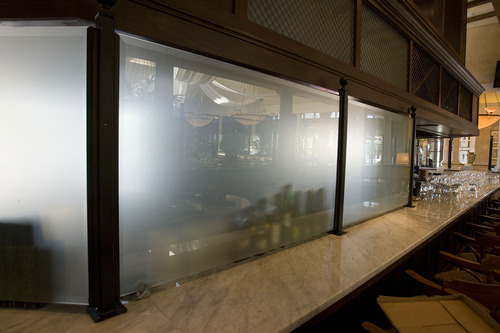This is an archived article that was published on sltrib.com in 2014, and information in the article may be outdated. It is provided only for personal research purposes and may not be reprinted.
Despite stiff opposition from conservative groups and even the LDS Church, legislators took a first step Tuesday to eliminate the "Zion Curtain" inside Utah restaurants and replace it with what could be called a "Zion Warning" instead.
The House Revenue and Taxation Committee voted 8-7 Tuesday to pass HB285, and sent it to the full Senate. It would get rid of the Zion Curtain, a 7-foot-2-inch opaque barrier that newer restaurants must have in bar areas so children can't see alcoholic beverages being mixed or poured.
Rep. Kraig Powell, R-Heber City, sponsor of the bill, included a compromise to give restaurants a choice of keeping the Zion Curtain, or instead posting a notice on all entrances and menus saying, "Notice: This establishment dispenses and serves alcoholic products in public view."
"It enshrines parents with the responsibility of whether or not their children are exposed to alcohol," said Committee Chairman Ryan Wilcox, R-North Ogden, who has tried unsuccessfully himself to eliminate the Zion Curtain. "It becomes the family's responsibility instead of the state of Utah."
A parade of restaurant and tourism officials testified that the Zion Curtain confuses tourists, leads to illogical serving practices, and does little to curb underage drinking. But conservative groups contended that removing it will lead to a culture of acceptance for alcohol, and expose non-drinkers to liquor.
Melva Sine, president of the Utah Restaurant Association, noted that only newer restaurants must have the Zion Curtain, putting them at a competitive disadvantage to older restaurants built before they were required and were grandfathered out of that rule.
She said rules allow all restaurants to display alcohol openly, so children see it. If a patron buys a bottle of wine or beer, restaurants are allowed to bring it and pour it into a glass at a table. But if patrons order a single glass of beer or wine, it must be poured behind the curtain and then delivered.
Joel LaSalle with the Salt Lake Area Restaurant Association said many out-of-towners think restaurants are pouring drinks behind the barrier because owners are trying to substitute cheaper liquor instead of premium drinks they may have ordered.
Nan Anderson, executive director of the Utah Tourism Industry Coalition, said, "We would support anything that would decrease what we call awkward moments for our customers. And the Zion Curtain is an awkward moment for many of our customers."
Rep. Doug Sagers, R-Tooele, shot back, "I would suggest it's also an awkward moment for the people who live in the state" and do not want to be exposed to alcohol for themselves or their children if the barriers are removed.
Laura Bunker, president of United Families International, said, "The separate alcohol preparation areas are an invaluable part of the environment that discourages underage drinking in our state."
She added, "A sign on the door speaks to adults. A partition speaks to children. It shields them from the glamour of bartending and sends a subtle but steady message that alcohol deserves more control and care than soft drinks or juice."
Before the legislative session started, the LDS Church also released a statement and video defending Utah's liquor laws and asked that they not be changed — specifically asking that the Zion Curtain be retained.
Powell said studies show that only 9 percent of the alcohol served in Utah is served in restaurants, and the focus on them with onerous rules including the Zion Curtain distracts the state from other efforts that may more directly stop underage or binge drinking.



